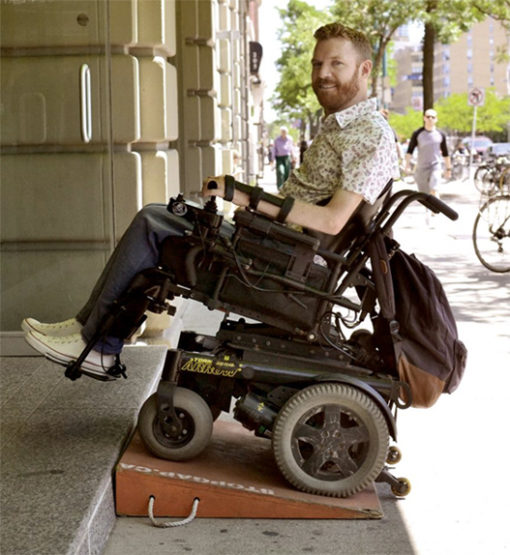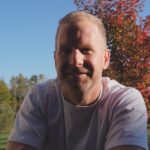Luke Anderson, social entrepreneur and executive director of StopGap Foundation requires assistance with everyday tasks. As a wheelchair user, Anderson depends on others to help with brushing his teeth, toileting, and getting in and out of bed. All of these responsibilities require a hands-on approach; the need for close contact that, as of recently, has become much more difficult.
“What has changed is our consciousness,” Anderson explains. “We need to maintain a high level of hygiene and sanitation. What [COVID-19] has done is forced me to dial-in; to bring about a new level of awareness of what’s going on with me and the people who are helping me. There’s no coasting anymore, no auto-pilot.”
The current COVID-19 quarantine measures have presented additional challenges to receiving care; advanced safety protocols having a disproportionate effect on many people living with disabilities. Nearly 6 million Canadians identify as living with a disability be it related to seeing, hearing, mobility, learning, or mental illness. Of these, an estimated 1.4 million require daily assistance. During a time of social and physical distancing; this can make for a difficult dilemma between a healthcare provider and the person they care for.
“As soon as they walk through the door, they go through a hand washing protocol, change their clothes, and wipe down all surfaces,” Anderson says of the personal attendants which help him during the day. He outlines a strict regime of cleaning and sanitation which accompanies each visit.
“For my helpers, there has been a learning curve as well,” he explains. “I’ve widdled my care team to two people. But I’m apart of a vulnerable group and have a compromised lung capacity. I need to take this serious!” He stresses, now more than ever, the importance of honest and open communication. “Work on establishing a new level of trust and connection with your friends and helpers,” he suggests.
Michelle Molubi is a personal care attendant based in Toronto who has seen significant changes to her work environment over the past few weeks. “My workload has increased in terms of duration, length of shifts, frequency of visits,” she says. “There’s extra cleaning, preparing and setting out meals [for clients] ahead of time.” She describes how before the quarantine measures were enacted, her visits were predictable and short. “They were pretty straightforward,” she smiles.
But COVID-19 has changed all that. “In the last week, we have ramped up sanitizing. Wiping down everything with bleach-water solution. Adhering to social distancing.”
Due to the uncertainty of the virus, Molubi extends the measures into her personal life as well. “My partner and I stay home. We only go out to the grocery store and always maintain social distance. I carry sanitizers and continually wash my hands. We keep our jackets and dirty clothes separate from the others. And we clean common surfaces several times a day. We’re always cleaning.”
She tells a story of a friend who worked in both a nursing home and for a private client. After COVID-19 surfaced, the friend needed to make the choice to work in either one place or the other. “[They] just work at the nursing home now,” Molubi says. But where does that leave the private client? “I’m not sure,” she admits. “I don’t know the whole situation.”
Anderson thinks through a similar scenario. “If [my attendants] get sick, then where does that leave me? Or if I get sick?” He shifts uncomfortably and pauses for a moment to collect his thoughts. “I guess it would be a matter of someone signing up and sacrificing to support me through that. That’s the reality.”
Anderson tries to stay positive despite the media being both a blessing and a curse. “There’s a shitload of fear and anxiety out there and it’s easy to get locked into the news and getting scared of death rates. It’s horrific. But my part in this is to hold a strict regime and share my knowledge with others.”
After working from his home office for more than a week, Anderson is looking forward to rolling into his lively Toronto office space shared with other social entrepreneurs. But he knows everything won’t immediately return to normal. “[COVID-19] is forcing us to figure out how to work in a different way,” he says.
His not-for-profit foundation raises awareness about a barrier-free and inclusive society through volunteer-led ramp-building events, corporate team building workshops, and innovative school programs. These initiatives require continuous funding to succeed. “[Our team is] determining how to reach out for support when a lot of people are struggling financially. We recognize the continued importance of staying connected to donors and friends.”
Despite these trying times, Anderson is holding onto hope and using his voice to encourage people to think beyond themselves, to consider the needs of others. “Accessibility, inclusion, and disability intersects all of our lives in some shape or form,” he says. “We’ve always been in this together, and now, even more so.”
Benjamin Rempel holds a Master’s of Public Health and is Member-at-Large for Health Promotion Ontario. His articles have appeared in PH SPOT, Health Promotion Practice, and other outlets. He lives and works in Toronto. Contact him at www.linkedin.com/in/benjaminrempel



Good piece of journalistic writing, Ben. The article focuses on Luke’s situation, but is really addressing the larger issue of accessibility in these unprecedented times. I like the way you brought Michelle into the discussion. You connected Luke’s predicament and Michelle’s role as part of the solution. Well done.